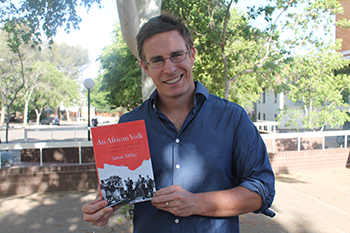Latest News Archive
Please select Category, Year, and then Month to display items
27 December 2021
|
Story Jóhann Thormählen
|
Photo Supplied
 The Kovsie Annerie Dercksen is one of South Africa’s most promising youngsters and climbing the cricketing ladder.
The Kovsie Annerie Dercksen is one of South Africa’s most promising youngsters and climbing the cricketing ladder.
She enjoyed every second of playing with some of her heroes and believes the exposure to international cricket will help her become a better player.
Annerie Dercksen is one of South Africa’s most promising youngsters and climbing the cricketing ladder.
Star from Beaufort West
This second-year Education student from the University of the Free State (UFS), who dreams of playing for the Momentum Proteas, represented the South African Emerging Women’s team three times in 2021.
The star from Beaufort West toured with the side to Bangladesh and also played against Zimbabwe and Thailand in One Day and T20 matches.
According to Dercksen, it is an incredible honour and privilege to be a part of a side.
She soaked up the experience and says everyone was willing to share their knowledge.
“I would have to say, sharing the field with some of my heroes and getting to work with some of the best coaches in the country are some of the highlights.”
She says each tour brought its own challenges and this helped her grow in the way she views and approaches the game.
“In Bangladesh we played against a well-established team in foreign conditions while facing a lot of spinners in spin friendly conditions. Personally, it was quite a challenge and I had to come back and work on some options, especially against spin.”
“Each tour brought its own challenges and this helped me grow in the way I view and approach the game.” - Annerie Dercksen
Coming through the ranks
The all-rounder has come through the ranks. She represented South-Western Districts at school level, played for the South African U19 side and is currently representing the Free State.
But Dercksen didn’t always dream cricket, especially not when playing ‘backyard’ cricket with her brother on the farm.
She didn’t even play for a team at school. “Until a boy from our primary school’s team got sick before a game. A teacher came to class and asked, ‘who can play cricket’, and I put up my hand.”
US author launches book at UFS on African volk
2016-10-17

Dr Jamie Miller, Postdoctoral Fellow at the
University of Pittsburgh and author of
An African Volk: The Apartheid Regime
and Its Search for Survival.
Photo: Rulanzen Martin
“I realised the importance of not just accessing the policies and political approaches of the leaders of the apartheid regime, but understanding the ideas and world views that informed them. Part of the solution to this was to learn Afrikaans.”
This is according to Dr Jamie Miller, a Postdoctoral Fellow at the University of Pittsburgh, on how he went about getting inside the mind of South Africa’s apartheid regime in order to complete his book, An African Volk: The Apartheid Regime and Its Search for Survival.
The book was launched on 11 October 2016 by the Archive for Contemporary Affairs at the University of the Free State on the Bloemfontein Campus.
Volk refers to the Afrikaner nationalist movement
The book is an ambitious new international history of 1970s apartheid South Africa. It is based on newly declassified documents and oral histories, the majority in Afrikaans, which focus on the regime’s attempts to turn the new political climate to its advantage.
The term volk refers to the Afrikaner nationalist movement, also known as Afrikanerdom. The story of Afrikaner nationalism was the medium through which the regime gained power.
Four main messages from the book
Dr Miller says there are four main messages for his readers. Firstly, the apartheid regime looked to contest and hijack new ideas and norms that formed the postcolonial world, and secondly, that we need to start thinking more seriously about the Cold War in terms of domestic politics, not just geopolitics.
Thirdly, South Africa should be integrated into histories of the global South, and lastly, we should conceptualise the apartheid regime by looking at it not just as an imperial holdover, but also by looking at what was happening in the world in the time period in question.